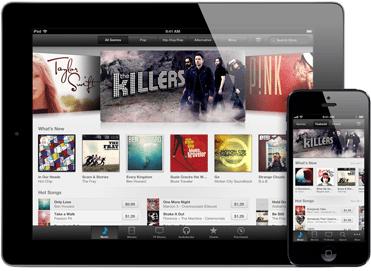The iOS 6 App Store changes are being met with mixed reviews, and I actually am not a fan of how they work from a user experience standpoint. But how are the changes affecting the ranking of apps, something developers depend heavily on for App Store success? Berlin- and London-based mobile analytics firm adeven, which recently launched Apptrace, an App Store performance comparison tool, helped us shed some light on app rankings changes in iOS 6.
There’s been talk that Apple’s rankings being newly based more heavily on sessions, social activity and search than on downloads, but the exact mix of what makes some apps rank above others isn’t ever made completely transparent. That being said, adeven co-founder Paul H. Müller believes that the evidence actually points to there being no or minimal changes to the actual algorithm governing rankings, and instead any changes are due more to other shifts, like the way search works and how the top charts are set up.
“If the algorithm had indeed been changed to a system based on anything other than the velocity of downloads, the repercussions would have been obvious and fast,” he explained in an email. “If the algorithm were based purely on sessions then Facebook would not be dislodged. We can already see that a good amount of apps are resuming their positions after the initial drop in rank. So the message is simple, carry on as normal and understand as best you can the App Store dynamics.”
There are some undeniable effects on the App Store rankings that go along with the redesign, however, as some have definitely changed position, Apple appears to be more aggressively promoting its own apps via in-App Store prompts for those who don’t have titles installed, Genius is given a place of prominence, and Passbook-capable apps appear higher up in rankings, according to adeven. So the strategy for better placement in the App Store changes for developers, even if the actual mechanics behind rankings doesn’t.
“You can try to optimize for keywords, which is still a bit of an uncharted area, since it still isn’t really known how Apple ranks things in search result,” Müller explained further in a phone interview. “Even more now than ever, you have to see what kind of users you’re acquiring via marketing. If you’re doing marketing, you shouldn’t do it blind, you should look at the quality of users you’re targeting. Before you could just buy downloads, get to the top and win. But now we can see apps show up often in Genius and search due to having strong networks, even though they don’t have the most downloads.”
Early evidence adeven is seeing suggests that users are really using Genius in iOS 6, too, meaning that apps appearing more often there have a greater chance of seeing increased download numbers. But to recap, app rankings still appear to be based on the same kind of criteria as before – but Apple’s overhaul of the store has led to a big change regarding which apps are attracting user attention and getting the most downloads.
